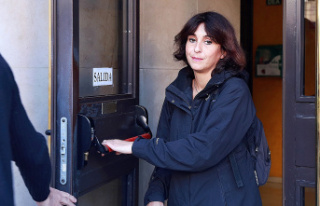The ninth day of the strike against Emmanuel Macron's unpopular pension reform has left apocalyptic images, almost a thousand fires throughout the country, 457 detainees, destroyed street furniture and images more typical of a country in conflict than of cities like Paris. or Bordeaux. The success of the call of the unions (there were 3.5 million demonstrators throughout the country, according to their figures, 1.08 million according to the Interior) has been marred by violence and protest, until now peaceful, and enters a new stage.
On Tuesday a new day of strike and demonstrations has been called and the visit of the King of England, Charles III, who was to arrive in Paris on Sunday, has been cancelled. "At the time when another day of mobilization has been called for Tuesday, we would not be serious if we proposed to the King and his consort to make a state visit in the middle of the protests in France," said Emmanuel Macron, asked about it during the press conference after the European Council in Brussels. "I have taken the initiative to call him, because common sense makes us postpone the visit", said the president.
The violence of the protest against Macron's reform, which aims to delay the retirement age from the current 62 to 64, reached its most extreme point on Thursday, after days of fiery protests. At the center of the debate is the performance of the forces of order in the different demonstrations that took place throughout the country. The Minister of the Interior, Gérald Darmanin, has denounced that the agents have been victims of attacks. There are 441 injured police and gendarmes, some seriously. "There are radicals who came to kill police officers," the minister has come to declare, who has accused the extreme left of stirring up chaos.
This, in turn, has denounced police violence. Darmanin has denied that this is systematic and has said that it may have occurred "individually in a moment of fatigue." The device to prevent the protests from getting out of hand was important: 12,000 agents throughout the country, 5,000 in Paris. "I have seen scenes where many officers are assaulted by prepared and extremely violent radicals," Macron said.
The trade unionist Laurent Berger has asked the government to "pause" the reform before "a drama occurs." Darmanin has said that a text cannot be withdrawn with the blackmail of violence. Eric Ciotti, president of the conservative Republican party, has shown support for the policemen "attacked by the extreme left in Paris." The deputy of La France Insoumisa, François Ruffin, has accused Macron of using the strategy of chaos and of "providing a police response to a political crisis".
A dozen investigations have been opened into some actions to assess whether there was abuse by agents. Amnesty International criticized a few days ago the excessive use of violence in the protests of the last week.
The fuse of anger lit last Thursday, when the pension reform was approved by decree, without going through the vote of the Assembly. Since then, protests have been repeated daily throughout the country, spontaneous and unauthorized demonstrations that have ended with the burning of containers, barricades, police charges and clashes between agents and protesters, especially in Paris.
In the demonstration on Thursday (authorized and called by the unions) in Paris, 2,000 controls were carried out and 1,500 radicals were detected. Shops, shop windows were destroyed, trash cans and part of the garbage that accumulates in the capital after two weeks of the strike of garbage collectors were burned. The police responded using tear gas and carrying charges. In one of the images of the pitched battle, a policeman is seen fainting while his colleagues try to help him. "Death to the king, death to Darmanin", read one of the affected shops. Similar scenes were repeated in Lille, Toulouse, Bordeaux, Lyon and in small cities.
The streets are a time bomb and the risk is that they will explode. "In the protest against the reform we have experienced two stages. The first, with peaceful demonstrations by the unions that demanded the withdrawal of the law. Now we have clearly moved on to another phase, with more violence and protests focused on the person of Macron, which It generates a lot of personal anger. We are entering a phase of uncertainty, we don't know what can happen," explains political scientist Luc Rouban, from Sciences Po.
While the street burns, the strikes continue in many sectors. The Government has had to intervene in the refineries so that the fuel reaches the gas stations and airports, which had warned that they were in a critical kerosene supply situation. Civil aviation has asked to cancel 20% of flights on Monday while Paris is still flooded with garbage and is already going through its third week of strike of garbage collectors.
According to the criteria of The Trust Project












